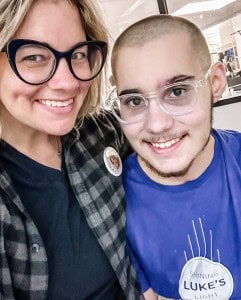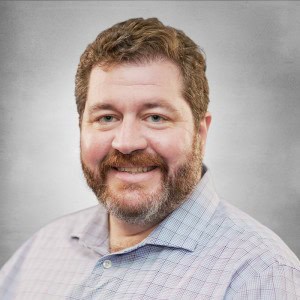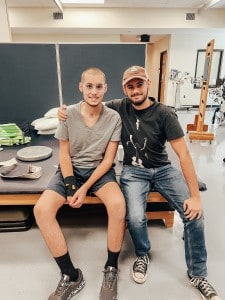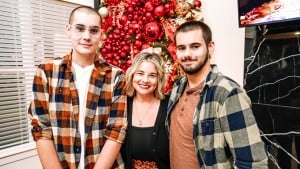When Ellie Talley’s son Luke was in a serious car accident, she was suddenly thrust into the scary, stressful world of a trauma intensive care unit.
She found a crucial source of support and assistance in Dr. Jeffrey Nelson and his palliative care service, which is designed to alleviate suffering for patients and their loved ones during a serious illness or injury.
As Regional One Health’s trauma team used their expertise to help Luke heal physically, Dr. Nelson and his team used their skill and compassion to help the family navigate the challenging time.
For years, Ellie Talley was lucky.
Despite raising two active teenage boys, she had never faced a medical crisis. “No one ever had a broken bone. No one ever needed stitches. The most we had was an antibiotic every couple years for a sinus infection,” she said.
When her son Luke was in a serious car accident, her whole world changed.
“Being thrust into a traumatic event was shocking,” Ellie said. “We’d never dealt with anything like this. It was never part of our lives.”
Dr. Jeffrey Nelson and his Palliative Care team at Regional One Health were key to helping her support Luke to make an incredible recovery. “When I look back on my experience, I don’t see how I could have done it without Dr. Nelson,” Ellie said. “It really was a game-changer for me.”
It all started on a day that should have been full of promise and joy.
A confident, responsible young man with a diverse, close-knit group of friends and lively sense of humor, Luke was driving home from school August 21 to get ready for his senior portraits.
“We live in Rossville, and we have little two-lane country roads he drove on every day,” Ellie said. “I was tracking him on my phone. When his car stopped, I knew something was wrong.”

Ellie Talley’s son Luke was on his way home to get ready for his senior portraits when he was in a serious car accident. Suddenly, the family was thrust into the world of the trauma ICU at Regional One Health.
Luke had fallen asleep and veered off the road, striking a fallen tree. The impact flipped his car, and it landed on its side. He was barely a mile from home.
Ellie and older son Chapman rushed to check on him. “We came over a hill and saw firetrucks and ambulances and traffic backed up for half a mile,” she said. “We pulled off onto a driveway and ran the rest of the way. It was the worst moment of my life.”
It took first responders 30 minutes to free Luke from the mangled vehicle. He was airlifted to the Elvis Presley Trauma Center with a traumatic brain injury, compression fracture in his spine, and broken jaw, nose, and orbital bones.
The Elvis Presley Trauma Center is the only Level-1 Trauma Center in a 150-mile radius of Memphis. A multispecialty team of experts including surgeons, anesthesiologists, trauma nurse practitioners, certified registered nurse anesthetists, nurses, respiratory therapists, orderlies, x-ray techs, lab techs, medical students, etc. is ready 24/7 to mobilize immediately. For patients like Luke, having prompt access to that advanced care is critical to survival.
Luke spent 27 days on a ventilator in the trauma intensive care unit followed by four weeks at the Extended Care Hospital. His initial prognosis was grim: “We were told we could expect within a year he might be able to sit in a wheelchair and recognize people,” Ellie said.
For Luke, it was a physical ordeal that included surgery, a bout with pneumonia, and grueling rehabilitation therapy. For Ellie, the toll was emotional: “I slept in the critical care waiting room every night because I wanted to be as close to him as I could. It was my worst nightmare.”
But just as trauma doctors and nurses worked with skill and compassion to heal Luke’s physical injuries, Dr. Nelson’s team stepped in to support Ellie and her family emotionally.

“At its core, palliative care is how medicine shares the human experience of suffering during serious illness, and attempts to use a whole-person model to alleviate that suffering,” Dr. Jeffrey Nelson said. “Palliative care is about how you live – not how you die.”
When Ellie first heard “palliative care,” she was startled, as the term is often associated with end-of-life care. “Dr. Nelson immediately calmed my fears,” she said. “He told me, ‘Everything you’ve heard about palliative care, ignore that.’”
Dr. Nelson noted there are a lot of misperceptions about palliative care. Part of that is because the field is new, but it is also because palliative care looks different from patient to patient.
“At its core, palliative care is how medicine shares the human experience of suffering during a serious illness, and it attempts to use a whole-person model to alleviate that suffering,” Dr. Nelson said. “Palliative care is about how you live – not how you die.”
While it can be part of end-of-life care for patients with terminal illness, it can also be provided alongside other treatment for patients like Luke who are able to recover.
Palliative care for a young, otherwise healthy person who is thrust into the medical world due to an accident often focuses on helping the family understand and process what’s happening.
“All of a sudden they’re hearing from a dozen doctors and fellows and residents in the first 24 hours, all of them offering decisions that are truly life or death. It isn’t feasible to expect anyone to sift through that,” Dr. Nelson said. “We focus on translating that into digestible pieces of information. That helps the family understand what’s happening, and it helps us understand what is most important to them so we can talk to the medical team about what’s right for the patient.”
It was exactly what Ellie needed.

Luke and his older brother Chapman are best friends. Chapman deferred his freshman year of college after Luke’s accident, and now the brothers will get to head off to school together.
As Dr. Nelson explained Luke’s machines and medications, answered her questions, connected her to resources, and helped her advocate for her son, she felt herself getting stronger.
“There’s value in finding someone you can lean on in your darkest moments, and Dr. Nelson was absolutely that person for me,” Ellie said. “He shepherded us through this process and helped us navigate all the ‘what ifs’ and possibilities. It was a blessing.”
Palliative care also provides much-needed continuity. While families will interact with numerous different trauma doctors, they see the same faces daily from the palliative care team.
If someone has a long hospital stay, Dr. Nelson can build a genuine relationship that allows him to better serve their needs. He also helps families look at the long-term picture rather than getting mired in the daily rollercoaster of intensive care.
“We talk with them about forgetting the daily ups and downs and focusing on what it’s going to look like for the next few weeks and months while their loved one recovers,” he said.
That was the case for Ellie as Luke started to wake up three weeks after his accident. “Luke is a musician; he’s been singing before he could talk, and he plays guitar and piano. I was playing John Mayer because that’s his favorite guitarist, and he started mouthing the words,” she said. “I didn’t trust what I was seeing, but his nurse saw it too. We had tears streaming down our faces.”
Dr. Nelson helped the family transition to the Extended Care Hospital for physical, occupational and speech therapy, and prepared them for Luke to go home.
Now, “Luke is doing absolutely amazing,” Ellie said. “He’s walking and talking and spending time with friends. He’s playing the guitar. He’s taking online classes, and he was accepted to college. In a lot of ways he’s back to his life, which is amazing to me.”
Luke will continue outpatient therapy, but other than that, his focus is where any 17-year-old’s should be: the future. He plans to study audio production and music business in college, and will room with Chapman, who deferred his freshman year of college after Luke’s accident.

“Luke is doing absolutely amazing,” Ellie said. “In a lot of ways he’s back to his life, which is amazing to me.”
“They’re best friends,” Ellie said. “They’re the most important person in each other’s lives.”
Ellie is grateful not only for her sons, but for Dr. Nelson. “I would have struggled in a million different ways without his support,” she said. “It changed my life. I’m a different person because of the support he gave me during this time.”
For Dr. Nelson, it is an honor to walk alongside families during their darkest moments.
“Something that should be celebrated is how people like Ellie and her family show so much resilience and so much grace. It really is a privilege to watch someone go from shock to taking it on,” he said. “It’s amazing how tough people are.”